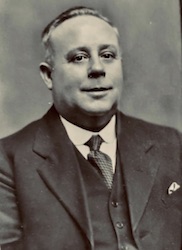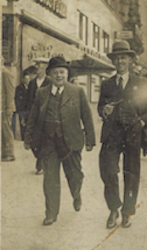Joe Cragie was a founder member of Bermondsey ILP, rising from poverty to prominence as leader of the council. He played a crucial role in the socialist successes of Ada and Alfred Salter, but until now has remained hidden from history. GRAHAM TAYLOR uncovers his story.
Two years ago we celebrated the Salter Centenary, 100 years since Ada Salter was elected mayor and Alfred was elected MP. From November 1922 until 1929, there followed seven years of intense municipal reform. Slums were demolished, model housing built, 7,000 trees planted, health clinics set up, health education launched, recreation grounds opened, music sponsored – and all done on a grand scale and at unequalled speed.
 It was impressive. But during the celebrations few asked: “Well, who actually did all of that? Who ran Bermondsey at that time?” It could not have been Alfred Salter because he was MP. And it could not have been Ada because, although on several committees, she never led the council. So who did push through all those radical reforms? In fact, it was a “small man with a bowler hat”, a railway worker down at Willow Walk called William ‘Joe’ Cragie.
It was impressive. But during the celebrations few asked: “Well, who actually did all of that? Who ran Bermondsey at that time?” It could not have been Alfred Salter because he was MP. And it could not have been Ada because, although on several committees, she never led the council. So who did push through all those radical reforms? In fact, it was a “small man with a bowler hat”, a railway worker down at Willow Walk called William ‘Joe’ Cragie.
Cragie (pictured left) had been with the Salters from the beginning. He was one of the 14 pioneers when Alfred formed a local branch of the Independent Labour Party (ILP) in 1908 alongside Ada and Charles Ammon. Alfred and Ammon later became MPs and Ammon a minister in the Attlee government.
By 1912 Cragie had risen to prominence as a leader of striking railway workers at the Bricklayers Arms goods depot. In 1919 he was elected a Bermondsey councillor in Ward No. 4, with Ada as his running mate. In 1921 he was elected leader of Bermondsey Labour Party and in 1923 he followed Ada as Mayor of Bermondsey. By 1928, no other councillors could get anywhere near the votes of Ada Salter (1,700) or Joe Cragie (1,675). They were by far the most popular councillors in the borough.
Although Cragie worked closely with Ada, both on the Board of Guardians (which supervised the workhouses) and as a ward councillor, his biggest service was to Alfred. In 1919-21 Alfred’s career was nearly terminated when the almost Communist far left, led by Angus Bamford, took over the leadership of Bermondsey Labour Party and threatened to remove Alfred as the parliamentary candidate. Bamford expressed sympathy with Lenin and demanded “ruthless war on landlords for the benefit of the lower orders”.
When it was clear Bamford commanded a majority in the local party, Alfred suffered a nervous breakdown and Ada had to whisk him off for a recuperative holiday. It was Cragie who stepped in to save the Salters. He discredited Bamford with some deft tactics, to the extent that Bamford left the area.
If Cragie had not intervened, it is possible Labour would not have won the election in 1922; Alfred would not have been elected MP; Ada would not have become mayor; and in 2022 there would have been no Salter Centenary to celebrate. Indeed, it could easily be argued that without Cragie there would have been no Bermondsey Revolution in the 1920s and no Salter legend, whether Alfred’s radical health measures or Ada’s housing and beautification programmes.
Cragie was also invaluable in delivering the trade union support to Alfred that his high-mindedness and lofty principles did not easily attract. As leader of the postal workers, Ammon drew his members to Alfred’s side, but so did Cragie as local leader of the National Union of Railwaymen, whose members worked in their hundreds at the Bricklayers Arms and Willow Walk. He also helped to boost the Labour votes of Irish Catholic dockers along the waterfront, who’d been told by their priests that all socialists were atheists.
Cragie’s secret
Joe Cragie grew up in appalling poverty and educated himself at the local library. So what was the secret of his success? Cragie’s mother was Irish (maiden name Mulhaney) and his surname was Scottish (he and the family often spelt it the Scottish way, as ‘Craigie’) – and he seemed to take pride in his Celtic roots.
From these roots he drew an Irish sense of humour – impartial and ironic – plus charm and common sense. When Ada decided to dispense with her mayoral chain on egalitarian principles, Joe told her it seemed a bit over the top, “since no one will be able to tell who you are”.
 When his father found out Joe’s brother was not his child, Joe wrote simply: “This came as a surprise to him.” In 1921, when Councillor Burgess of the far left demanded a rule that all employees in the workhouse should be trade unionists, Cragie said he was against forcing men to join the union as “in my experience they never pay their membership dues”. Although a temperance man, he never minded others
taking an alcoholic drink, and would drink himself “if he was thirsty”.
When his father found out Joe’s brother was not his child, Joe wrote simply: “This came as a surprise to him.” In 1921, when Councillor Burgess of the far left demanded a rule that all employees in the workhouse should be trade unionists, Cragie said he was against forcing men to join the union as “in my experience they never pay their membership dues”. Although a temperance man, he never minded others
taking an alcoholic drink, and would drink himself “if he was thirsty”.
He was able to deploy this ironic understatement to telling effect in stormy debates. In 1919, when the young local Labour leader, Angus Bamford, made Communistic remarks, leaving both Liberals and Conservatives foaming at the mouth with rage, Cragie calmly stepped forward, the press reported, “soft-voiced and quietly effective”.
At work he was well respected not only by workers but by employers for his “exceptional shrewdness and calm deliberation”. He differentiated between good employers and bad, and never rushed into irresponsible strikes. On the other hand, whenever a strike did break out, he was impressively effective. In 1919 there was a rash of strikes across the country and most were lost, but the railway workers in Bermondsey, led by Cragie, were among the few that won.
Cragie performed his union role in such a way that both rank and file workers and “good employers” appreciated him. In 1924 Joe and his wife, Louisa, celebrated their Silver Wedding at the Town Hall. To his astonishment, Arthur Carr of the Peek Frean biscuit factory, a leading local employer, presented him with a cheque for £60 and an inscribed silver cigarette case. Louisa received an inscribed silver handbag and a bouquet of roses. The £60 had been donated by several local employers and Cragie said it was the only time in his life he was so overcome with emotion he found it difficult to make a speech.
His ability to handle a situation with shrewd acumen was demonstrated most famously in 1922 when he was chairing Alfred Salter’s last rally on the evening before the general election. Alfred had enthralled his audience with sturdy denunciations of capitalism, and all seemed well until he reminded the crowd that he was teetotal and a pacifist. If they wanted an MP who would vote for cheaper beer, they should elect one of the other candidates, he told them, not him. If they wanted an MP who would vote to fund the army and navy, they should cast their votes elsewhere. If elected, he said, he would close down as many pubs as he could.
He sat down to a stunned silence followed soon by prolonged applause. Cragie stood up and made the crucial point: “That is your tribute to honesty and fearlessness. If you want a man of principle to represent you, you will vote for the doctor.” The next day Alfred trounced the Reverend Kedward, his Liberal opponent, by 7,550 votes to 5,225 and became the first Labour MP for Bermondsey.
Ada felt a real affection for Cragie. When he became mayor in 1923 it was Ada who made the speech congratulating him on becoming “chief citizen”. During her speech she said: “We always like him, even if we do not always agree with him. Even with his faults, we like him. We realise his sense of humour and real common sense, and we believe that these attributes will ensure his having a successful year of office.”
Cragie died in Lewisham in 1963. At the end of his career Bermondsey Labour’s magazine judged that, given his loyal support for the Salters and his impressive handling of council business, “much of the success of municipal socialism in this district” was due to him.
The Town Clerk, Mr JS Lambert, summed him up: “He had a wonderful way with him which helped to calm people down when tempers got a bit heated. He was probably one of this council’s greatest characters.”
**
Afterword from the author
‘Until recently no one could write about Joe Cragie because there was no information about his life. That changed in 2019 when I received a message on the Ada Salter Facebook page from Matthew Rowley, saying, “I am currently researching my great great grandfather, William Joseph Craigie…”
‘Matthew sent me an album of old photos and put me in touch with his mother, Marion, who had mementoes of Joe, including the silver handbag Arthur Carr gave Louisa on their 25th wedding anniversary. Marion told me that Joe was not at all Scottish, despite the name, but “a real Cockney”, and had told the family he was born in Bermondsey “under the arches”.
‘The photos of Joe in the text above were sent by Matthew. On the back of the second, taken in Berlin in 1930, is written: “William Joseph Craigie JP, small man with black bowler hat”.
‘The greatest gift Matthew sent was Joe’s own memoir, written in his own handwriting. I transcribed it with only a few adjustments to punctuation, leaving the grammar uncorrected to retain the Cockney flavour of Joe’s speech. It is a moving tale of his struggle out of poverty to become leader of Bermondsey Council.’
You can read Graham’s transcription here.
—-
Both this article and Joe Cragie’s memoir were first published in 2023 in The Redriffe Chronicle, the magazine of the Rotherhithe and Bermondsey Local History Society. We are grateful for permission to reproduce it.
Graham Taylor is the author of Ada Salter: Pioneer of Ethical Socialism published by Lawrence & Wishart and available to buy here for £20.00.
Graham Taylor’s ILP pamphlet, Ada Salter and the Origins of Ethical Socialism, can be ordered now from our Publications page.


